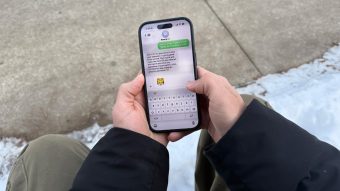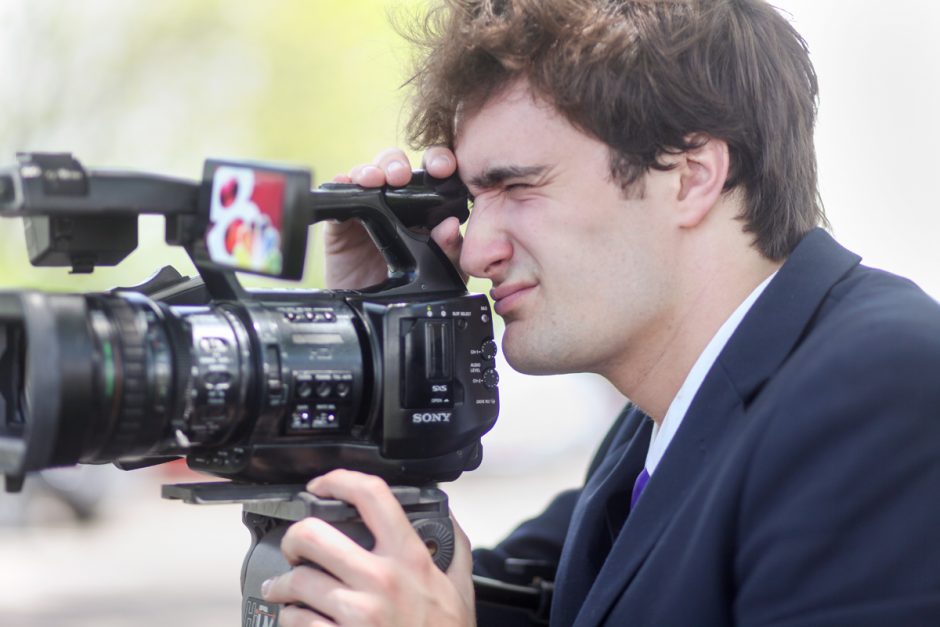
Chris Brown comes from Chesterfield, Missouri. In high school he ran track and was a captain of the football team. He was outgoing and energetic.
He enrolled at the University of Missouri full of determination, excitement and impatience. A zealous cinephile, he saw college as a necessary speed bump on his path to a Hollywood career.
Brown remembers dates. That’s one of his things. Dates and movie dialogue. One date he mentions often is Wednesday, Aug. 15, 2012: move-in day freshman year. Another is Friday, April 11, 2014. That was the day he learned he had autism spectrum disorder. The day he finally understood why everything that had started with such promise had gone so wrong.
Now a new Mizzou graduate, he credits a team of student mentors, Mizzou therapists and loyal friends with helping him to learn about himself and his condition and to put his life back together again.
Making connections
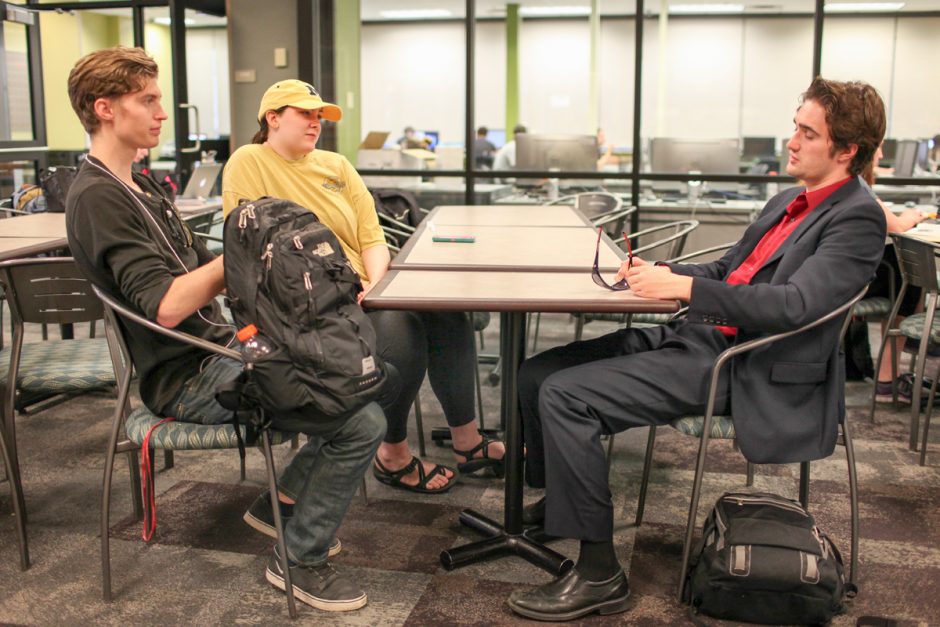
Brown walks into the annex of the Pershing Commons Residence Hall wearing a black suit, a white dress shirt and a black tie. He takes a seat across from Eric Brashear and Grace Freeman and explains that he just came from shooting a stand-up for KOMU, the local NBC affiliate that doubles as a training ground for School of Journalism broadcast majors.
It’s late afternoon, and the south windows, facing the sprawling medical campus, are full of light. The north windows, crowded by the Defoe-Graham Residence Hall, are shaded. Brown sits, sets his backpack down and then asks Freeman to switch places with him. She’s in his normal seat. He wants to face the south windows.
It’s their second meeting of the semester. Brashear and Freeman are both students in Colton Miller’s Psychology 4001 course, which teaches neurotypical students about autism spectrum disorder (ASD). It also has a mentorship component, the Autism Mentor Program, which pairs two students from the class to co-mentor a student on the spectrum. They meet weekly throughout the semester to provide peer support and guidance.
This is Brown’s third semester being mentored. He credits the weekly check-ins with helping him to master social cues and be more relaxed in social situations.
They start each meeting with a rundown of the weekend, which for Brown means a review of the movies.
“I saw Deadpool,” he tells them. He’s from the St. Louis area but speaks more like a Chicagoan — quickly, with volume and with “th”-less “dats” and “doughs.”
It is common for people on the spectrum to have an intense interest in a particular subject. For Brown, though, movies are far more than merely an interest. They’re his calling. He loves to watch them, quote them, write them, produce them, act in them. He has auditioned for TV roles and has made several self-produced short films.
Miller, a licensed psychologist in the Mizzou Student Health Center, compares ASD to being on vacation in a foreign country where you don’t know the customs. Given that analogy, movies have been Brown’s Rosetta Stone. As a child, they helped him learn how people interact and how he should behave in different situations. “I learned my manners from watching Disney movies,” he says.
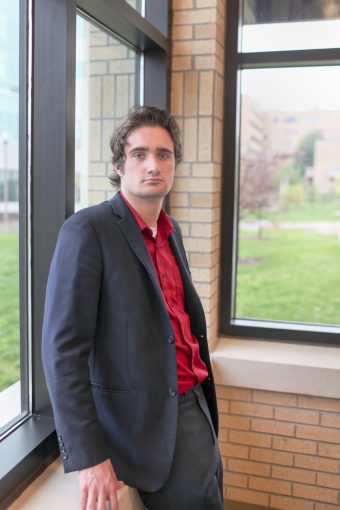
Autism Spectrum Disorder
The first documented case of autism was in 1943. Around the same time, Dr. Hans Asperger, an Austrian pediatrician, was characterizing children who had a high-functioning form of autism, a condition that later became known as Asperger’s Syndrome. Clinicians no longer consider them separate conditions but rather one disorder with a continuous spectrum of symptoms, thus the name autism spectrum disorder.
ASD affects one out of every 68 children born in the United States, according to the Centers for Disease Control and Prevention. The condition is typified by a lack of social understanding, limited ability to have a reciprocal conversation, an immature ability to manage emotions or show empathy, and behavior that is either socially withdrawn or domineering.
Not all of these characteristics are present in every person with ASD, and when they are present, they don’t necessarily manifest in the same way. As Miller is fond of pointing out, “If you’ve met one person on the spectrum, you’ve still only met one person on the spectrum.”
Some children are diagnosed with ASD before age 2. For others, symptoms aren’t evident until they start school. But students with ASD who are very high functioning can find refuge in the structured, supervised activities K-12 schooling offers, such sports, the arts or student clubs. These students might escape diagnosis until college or later, if ever.
“I’ve seen how autism can negatively affect someone’s college experience if undiagnosed.”
“I’ve seen how autism can negatively affect someone’s college experience if undiagnosed,” Miller tells his class. “I have met people in their 50s who were never diagnosed, and it has destroyed them.”
Comfort zones
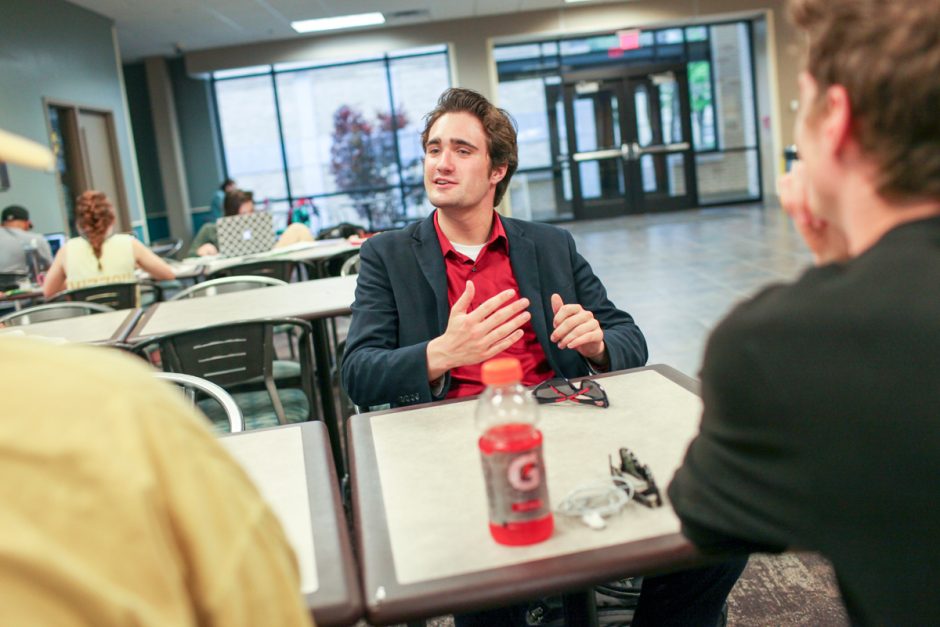
Brown spent his whole childhood in the same Chesterfield neighborhood. “I’ve never had to be the new kid in school,” he says. He took his same elementary school friends with him to middle school, then to high school. He ate peanut butter and jelly sandwiches every day for lunch. He packed his books in the same Columbia backpack he’s used since fourth grade. He stayed busy with bowling leagues, football and track.
Life in Chesterfield was very orderly and predictable. Mizzou was something different.
On his own for the first time, Brown had a rough first semester. He liked being social but didn’t feel comfortable at parties. He was more comfortable getting to know people through residence hall government meetings or Bible studies. He related more to his two resident advisers, whom he befriended. But they became the start of a pattern in Brown’s social life. Like most college men, Brown wanted a girlfriend. But when his feelings of friendship with a woman turned into something more, those friendships usually ended awkwardly. By the close of his first semester, despite making good grades, he was thinking about transferring.
He spent the next spring and summer in Orlando, Florida, in the Disney College Program. He worked as an intern at the Disney World resorts, met other students from around the world, earned a little money, got a lot more sun, and came back for his sophomore year re-energized.
That fall he joined a service-oriented student club. He related better to the students there and thought he was making friends. Everything felt good. But not everyone shared that perception.
Brown explains what happened next from the remove of two years of therapy and learning about how his ASD manifests itself.
The breakdown hinged on very different social perceptions. Brown saw new friends that he wanted to hang out with; the other club members saw a new person who was badgering them with invitations to coffee or lunch that they repeatedly declined. By the spring semester, one of the students reported that she felt harassed. On April 7, they voted to suspend him.
A few days later, he called his mother, distraught.
For parents, knowing when to tell a child he has ASD can be a difficult decision. No parent wants their child to feel different or inferior. Growing up, Brown had done well in school and was happy. So, although some of his teachers suspected he was on the spectrum, his parents didn’t tell him. But now things were different. Now he was on the phone trying to figure out what he had done to be rejected so thoroughly by his peers. So his mom broke the news.
It took him by surprise.
“I dropped a huge f-bomb; that’s for sure.”
A little help from his friends
Brown considers spring 2014 a dark time, but it was also a turning point.
“I’ve always felt I was different,” he says. “I never knew about it being autism.”
Armed with an explanation, he threw himself into learning about the disorder and about himself. He registered for therapy with the MU Counseling Center, bought Asperger’s for Dummies — “Totally worth the purchase,” he says — and signed up with Miller’s Autism Mentor Program through the MU Student Health Center.
Around the same time he switched apartments and started rooming with an old friend he’d known since grade school, Seth Eisenkramer.
The process of personal growth and change is a gradual one. Brown was aware of certain challenges already. People had always told him that he was too serious. When most people ask someone to coffee, it’s a casual “hey, this could be fun” kind of question. When Brown asked, it was more like asking them to join the military.
Eisenkramer noticed other things, like not knowing when was an inappropriate time to tell a joke or where the line was between friendly teasing and hurting someone’s feelings.
In high school Eisenkramer volunteered with people who are on the spectrum, so he was un-phased by Brown’s diagnosis. “It shouldn’t be a big deal,” he says. He has a calm, observant affect that suggests he lets very little become a big deal.
Eisenkramer has served as a daily sounding board for Brown, filling the gaps between his weekly meetings with peer mentors and between therapy sessions. Like an instant replay official in sports, Eisenkramer can listen to Brown’s retelling of a weird situation and suss out who caused the awkwardness.
The two were friendly but not especially close in Chesterfield, but the past two years have made them best friends. “Helping him become more social has helped me become more social,” Eisenkramer says.
Brown hasn’t experienced a dramatic moment of personal growth. No burst of insight that suddenly made life easier. It’s been just a daily look in the mirror and a willingness to take responsibility for what he sees there. These are the situations I find myself in. What parts are my fault? What can I do to correct them? How can I do better in the future?
It’s a process everyone goes through, though seldom with the focus that Brown has.
For all the challenges ASD has brought him, it has also given him certain abilities. Brown has an exceptional memory, attention to detail and task focus. They’re traits he has instinctually used to navigate a neurotypical world. Now he uses them to understand ASD.
“That summer [after being diagnosed] I felt like Ben Affleck in Daredevil,” he says, “using the gifts Asperger’s gave me to make a difference.”
Looking back, he can see now how far he’s come. “I am not the same person I was four years ago,” he says. “Lots of my friends from high school are still the exact same person. I have grown so much since I was 19.”
Part of that growth is taking responsibility for the past, especially the lost friendships that are beyond saving, and accepting them. Mourning them. “The positive memories hurt more than the negative ones,” he says. “You think about them and go, ‘Dang, those were good days.’ I still wish I could relive everything and unscrew all the social mistakes I made. But I can’t change the past. I can change the future. And college is still a chapter early in the book.”
Life is about to change a lot for Brown. He’ll find a new job, likely in a new state (he’s aiming for California), and will have a chance at a fresh start. The tough social lessons he’s learned at Mizzou will help make every new social interaction better.
“I’m going to meet thousands of people,” he says. “Losing those people here may have been the best thing for me.”
Independence Day
Much of Brown’s weekly mentoring sessions this past semester focused on his impending graduation. He kept a daily countdown. Mizzou started as a speed bump. By the end it was a safe haven. Brown was ready to be done with classes, but is nervous to strike out on his own.
“I’m worried about what life is going to be like when I don’t have free mentors and free therapy,” he says. No matter how far he’s come, he knows life’s challenges will be new every morning. “Social cues change all the time. Ten years ago, people still rang doorbells. Now they text and say, ‘I’m here.’ ”
Nevertheless, Sunday, May 15, 2016, is another date Brown is sure to remember. It’s the day he graduated. The day he looked back at all he’s overcome, looked forward to all he wants to do, and mustered the courage to move forward.



